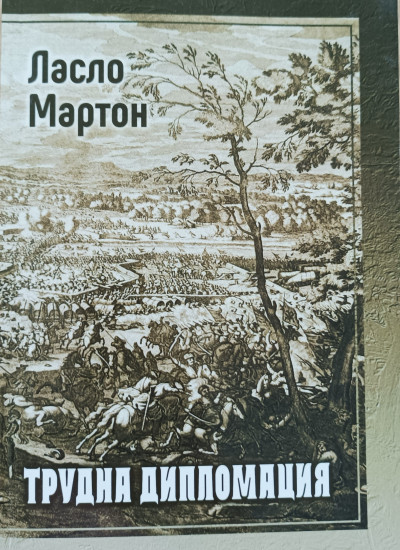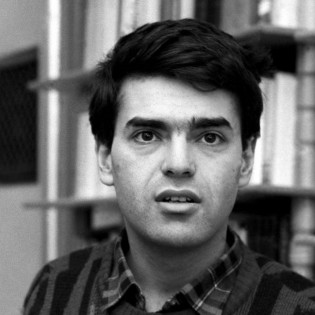The Difficulties of Ambassadorship (Fraternity III.)

The novel is the third book of the Fraternity-trilogy and continues the story of the second part, Heaven’s Three Drops of Blood. However, it can be read as an independent novel without knowledge of the first two books.
The novel follows various storylines simultaneously. One of them is the signing of the Treaty of Karlowitz between Turkey and the European powers. This peace – if it is made – would bring rapid progress, safety, and the opportunity to rebuild for Hungary and the Balkan region. Ibrahim pasha, the father of Kartigam in Menander’s novel is present at the negotiations alongside many other characters from the novel about Kartigam. The second storyline recounts the preparations for the lawsuit against a swindler under the name István Károlyi, specifically focusing on testimonies. The real István Károlyi, it turns out, with whom witnesses were familiar before the battle of Zenta in 1686, is now not remembered by anyone. Witnesses cannot recall his looks or his habits, and if they can, they are faced with contradictions. In the meantime, István Károlyi (or the swindler who bears his name) marries a wealthy widow so that he does not need the fortune of his brother Sándor Károlyi, which would have been the object of the lawsuit. He moves away from his brother’s home to his wife’s. However, this reveals his connections to anti-imperial rebels, the Kuruc forces, meaning he is confronted with his loyal brother in a civil war situation. The third storyline follows the fate of the novel about Kartigam. The wife of Sándor Károlyi, Krisztina Barkóczy, gets more and more obsessed with it. Not only does she identify with Kartigam, baptized Krisztina, but she also finds herself more and more frequently at the imaginary locations of the novel, while its characters are getting more active in reality.
Finally, the peace of Karlowitz is made, but most of the Balkans remain under Turkish power. The lawsuit is decided, too: the jury declares István Károlyi a swindler and an identity thief and orders his arrest. The verdict states that in reality he is not István Károlyi but a vagrant named Gergely Nagy who abused his resemblance to István Károlyi and his knowledge of the Károlyi family. Except István Károlyi cannot be arrested due to the fact that he has been killed by his own soldiers, the Kuruc men. However, the real Gergely Nagy appears and almost gets hanged for an old crime he committed, but in the end, he is left alive to live happily ever after.
The Difficulties of Ambassadorship, similarly to the first two parts of the trilogy, mixes the features of ancient adventure and baroque courtyard novels with the postmodern historical novel.
László Márton’s trilogy connects the three levels of identity: the self-identity of the identity thief István Károlyi is written into the uncertain identity of Hungary being freed from Turkish domination, all of which materialized in the identity of the novel’s genre (and that of the manuscript of the novel about Kartigam). The author, while guiding the reader through a labyrinth of mirrors, combines the tradition of the baroque adventure novel with postmodern historiographic metafiction. Thus, The Difficulties of Ambassadorship and the entire Fraternity-trilogy are take their place on the shelf alongside important novels dealing with cultural memory, such as the works of Lawrence Norfolk, Christoph Ransmayr, Daniel Kehlmann, and Olga Tokarczuk.

László Márton was born in Budapest in 1959. He graduated from the Faculty of Arts at ELTE with a Hungarian-German-Sociology major in 1983. Since then, he has been freelancing.
His first work, a one-act play was published in a now defunct journal Mozgó Világ (Moving World) in 1981, and his first book, a collection of novellas, was published in 1984. He has since been writing and publishing and also translating classic works of German and Austrian literature. About fifteen plays of his were presented in theaters in Budapest and other parts of Hungary. Of these, the most important is a drama trilogy set during the period of Ottoman rule titled A nagyratörő (The Ambitious) (Eger, 2008–2010, directed by Tibor Csizmadia). He has also written radio plays and movie scripts, two of which were directed by Zoltán Kamondi: Tudatalatti megálló (Subconscious Station, 1990) and Halj már meg! (Die already!, 2016). Some of his significant literary prizes: the Tibor Déry Prize (1991); the Attila József Prize (1997); the Milán Füst Prize (1999); The Laurel Wreath of the Hungarian Republic (2004); the Sándor Márai Prize (2007); the Janus Pannonius Translation Prize (2013); the Glass Ball Prize, Budapest, Shop of Writers (2016). Márton is married and the father of three children.